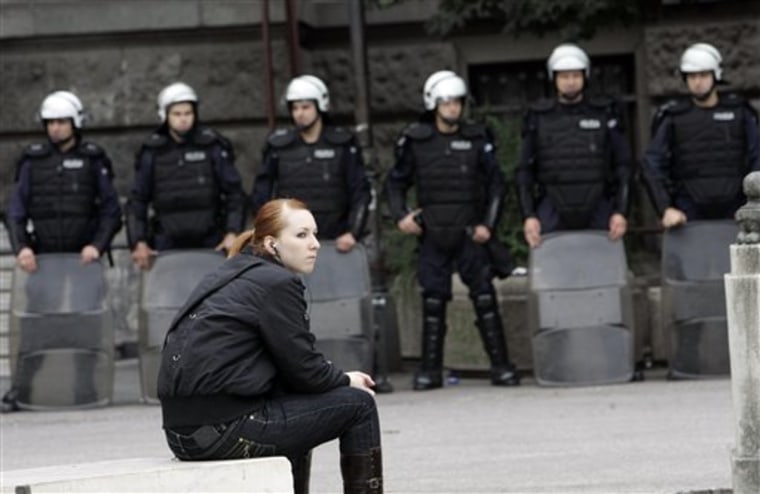Just a few months ago, thugs outraged at Kosovo's independence set part of the U.S. Embassy in Belgrade on fire, and ultranationalists prepared to seize power.
But this week's capture of genocide suspect Radovan Karadzic revealed an extraordinary turnaround for Serbia, and the prospect of yet another former communist country embedding itself in the West.
On the gritty streets of Belgrade, there was a palpable sense Wednesday that nationalism may finally be losing its iron grip on hearts and minds.
"It's a positive step. I think Serbia is going to move forward," said Sreten Tasic, a resident of the capital.
Many Serbs say their country simply reached a breaking point. In May, after decades of frustration with nationalists, a pro-Western bloc confounded opinion polls and won national elections on a promise to bring the impoverished nation closer to mainstream Europe.
Virtually overnight, the volatile republic's image has changed from that of a hoodlum in Europe's most rough-and-tumble neighborhood to a country well on its way to joining the European Union, the Continent's club of responsible democracies.
"The state of Serbia has made a giant leap forward," Prime Minister Mirko Cvetkovic declared triumphantly after Karadzic's capture Monday.
It's just a beginning
But if Serbia continues on its bold new path, it could follow in the footsteps of other ex-communist countries, including Bulgaria, the Czech Republic, Hungary and Romania. Today, all are members of the European Union and NATO, and count themselves among America's allies.
At its heart, Serbia was never truly anti-Western.
Under the late dictator Josip Broz Tito, who ruled from the end of World War II until his death in 1980, Yugoslavs traveled freely around Western Europe and the U.S.
It wasn't until the early 1990s — when the late Serbian strongman Slobodan Milosevic whipped up nationalist sentiment that led to the bloody breakup of Yugoslavia and international sanctions — that Serbs became embittered against the West.
What's changed? Why now?
Serbia has had pro-Western forces before, notably Zoran Djindjic, a reformist prime minister who was assassinated by nationalists outside the main government building in Belgrade in 2003.
And President Boris Tadic, who wants to bring his nation into the EU, has just begun his second four-year term.
Braca Grubacic, a prominent political analyst, offers a simple answer: After years of entrenched nationalism that survived Milosevic's ouster by pro-democracy activists in 2000, Serbia's leaders finally realized the international community is fed up.
The public saw three of the six former Yugoslav republics, Slovenia, Croatia and Macedonia, joining or on track to join the EU, and feared Serbia would be left behind.
"Serbia finally decided to do something," he said. "We realized the West is sick and tired of this old Balkan story. Enough was enough."
Quick work on Karadzic
Tadic's new pro-Western government took power only two weeks ago. One of the president's first acts was to appoint a new security chief to replace one who was a close ally of nationalist Vojislav Kostunica, the former prime minister.
Within days, Karadzic — rumored, despite denials, to have enjoyed Kostunica's protection for nearly a decade — was tracked down with no-nonsense efficiency and bundled into a police van. The former Bosnian Serb leader soon is expected to be extradited to the U.N. war crimes tribunal in The Hague, Netherlands.
Bruno Vekaric, spokesman for Serbia's war crimes prosecutor, said the change of government inspired the team that was working to hunt down Karadzic and Gen. Ratko Mladic, another genocide suspect who remains at large.
"There was a whole new energy that came with the victory of the pro-European forces" in May's elections, Vekaric said.
The ultranationalist Radical Party had been expected to win that vote and steer Serbia away from the EU and toward Russia. Instead, Tadic's bloc pulled off a stunning upset, although it needed to join forces with Milosevic's loyalists to form a government.
"The arrest of Karadzic shows that elections do matter," said Thomas O. Melia, deputy head of the U.S.-based Freedom House democracy watchdog group. "It's no coincidence."
Kostunica is gone, but the nationalist fervor he stirred up still simmers. Dozens of hard-liners threw stones at police in central Belgrade this week to protest Karadzic's arrest.
"There will always be a part of Serbian society who will be unhappy," said Grubacic. "We will always have these people. The key difference is that now we have the possibility to shed Milosevic's legacy and solve our problems."
But so far, there has been no widespread explosion of violence.
This week's protests have drawn only a few hundred demonstrators — a mere shadow of the up to 250,000 angry Serbs who jammed central Belgrade in mid-February to condemn the declaration of independence by Kosovo, which even today's Serbia considers its territory by profound historical right.
The payoff could be swift in coming: EU leaders made clear that Karadzic's arrest could speed Serbia's bid to join the 27-nation union, and suggested that capturing Mladic would help even more.
"The new government in Belgrade stands for a new Serbia, for a new quality of relations with the EU," said Javier Solana, the EU's foreign affairs chief.
"We have always said that Serbia has a place in the European family," British Foreign Secretary David Miliband said.
